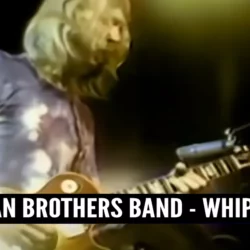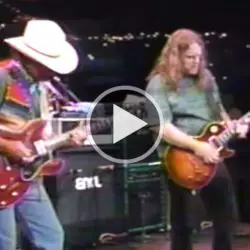“Whipping Post”: The Legacy of a Classic by The Allman Brothers Band
The song “Whipping Post” is a standout composition by The Allman Brothers Band, one of the pioneers of Southern Rock. The track, released on the band’s debut self-titled album in 1969, is revered for its potent lyrics, intricate guitar work, and a striking improvisational approach that elevated The Allman Brothers Band’s status in the rock ‘n’ roll pantheon.
Song Creation
“Whipping Post” was penned by Gregg Allman, the band’s lead vocalist and keyboardist, in late 1968. According to Allman, the inspiration for the song came late one night when he was feeling dejected about a failed relationship. He had nothing but an old ironing board and a burnt light bulb in his apartment at the time. On the ironing board, he found an old high school notebook, picked it up, and started writing.
The “Whipping Post,” as per Allman, symbolized a place where one is bound and metaphorically whipped by the trials of love and life. The lyrics – filled with imagery of torture, pain, and subjugation – encapsulate a bitter heartbreak, a universal theme that resonated with many listeners.
The song, composed in an unusual 11/4 time signature, was first deemed too complex. However, with drummer Jai Johanny Johanson’s contribution, it took a distinct shape, and soon, the rest of the band – Duane Allman, Dickey Betts, Berry Oakley, and Butch Trucks – added their respective touches to the song, cementing its place in rock history.
The Allman Brothers Band – Guitarists and Their Contributions
The song’s guitar work, primarily attributed to Duane Allman and Dickey Betts, stands out as a mesmerizing blend of rock and blues. Duane Allman, a slide guitar virtuoso and one of the founding members, played a key role in defining the song’s guitar sections.
Allman’s playing on “Whipping Post” is still widely acclaimed for its emotional depth and technical proficiency. His slide guitar parts, particularly in live versions of the song, have been hailed as some of the most inspiring performances in rock history. Tragically, Allman’s life was cut short in a motorcycle accident in 1971.
Dickey Betts, another original member, stepped up as the band’s primary lead guitarist after Duane’s untimely death. Betts’ playing on “Whipping Post” showcased his adeptness at creating melodic solos with a distinct, biting tone. His contributions, along with Allman’s groundwork, are vital to the song’s classic status.
After the death of Duane Allman, the band faced several lineup changes, with different guitarists stepping into the pivotal role. Notably, Warren Haynes joined the band in 1989, adding his unique touch to “Whipping Post.” A versatile guitarist with a deep understanding of the blues, Haynes’ playing on the song echoed the song’s emotive core while introducing a new tonality to the mix.
Derek Trucks, nephew of original drummer Butch Trucks, also joined The Allman Brothers Band in the late 90s. Trucks, known for his slide guitar playing, breathed new life into “Whipping Post,” delivering performances that paid homage to Duane Allman while showcasing his unique style.
Conclusion
The legacy of “Whipping Post” transcends time, standing as an iconic testament to The Allman Brothers Band’s prowess and creativity. The song’s journey, from its creation to the various renditions by talented guitarists, paints a vivid picture of a band that constantly evolved while staying true to its roots. “
Whipping Post” is a classic that remains impactful, a testament to love, heartbreak, and the enduring power of rock ‘n’ roll.





